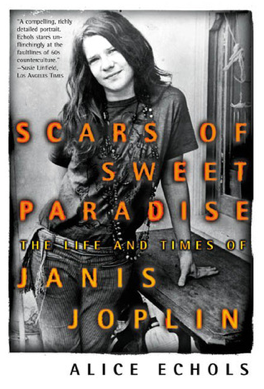University of Southern California
Gender Studies Program Mark Taper Hall of Humanities,
422 3501 Trousdale Parkway
Los Angeles, California 90089-4352 USA
Attention: Professor Alice Echols
Dear
Prof. Echols,
The content of your biography on the
life of Janis Joplin evoked in me a fresh perspective on the historical context
of the blues scene in the 1960’s. While the political and sociological climate
was ripe for radical change and revolutionary thought, the musical climate is
often overlooked or generalized as one big hippie-ridden, LSD-laden Woodstock
festival. Your biography, Scars of Sweet Paradise, The Life and Times of Janis
Joplin, not only examined the life of Joplin, but it presented parallels with the
counterculture of the 1960’s that are so relevant in its effects on the
nation’s current political and social climate. The racial, economic, and gender
divides during the 1960’s played such an influential role in the art and life
of Janis Joplin, which is a major underlying foundation of your biography.
The duality of her persona presented
such inner-conflict, which you examined closely in your book. I
visualized Joplin’s performances and music, but then connected her childhood
background from the early chapters and how that effected her internalization of
her insecurities. You create this sympathy for Joplin in the book, and give readers
such hopes for redemption, success, and happiness for her. However, much to my
own frustration, I never got the impression in your book that she was doomed
from the beginning—such an undertone is nearly impossible to avoid when writing
an account of a notorious tragedy. The self-destructive environment that you
recognized of the blues scene in San Francisco doesn’t present itself as a
foreshadowing to her untimely death. While I knew the story would be an
anti-climatic one with a far from Hollywood ending, I found myself convinced,
over and over, that Janis would end up living until the chapter on her
overdose. Figuratively, she lives on through her music, your book, and the
influence she had on modern day blues and rock.
Janis
Joplin bridges the gap between the early 1960’s folk scene and an electric rock
scene that emerges full-force in the 1970’s. It is that transition that truly
parallels the transition of the politics and societal norms and movements of
that period. The 1960’s were the period of revolutionary thought and action,
and the period of the emergence of Civil Rights, Black Power, Women’s Rights,
and Gay Rights movements truly gain momentum and nation-wide recognition. I was
looking for some more definitive examples of this throughout the book, but
there were mainly brief allusions to them amongst recounts of Joplin’s life.
From
what I interpreted after finishing the book, Janis teetered on the edge of
feminist and anti-feminist, especially in the radical sense of that time. While
she expressed female angst of inequality and mistreatment by men, she didn’t
identify with the feminist movement by any means--“it seems like they haven’t
had a good time in months (306)”—and invaded the male-ridden industry with her
persona, yet that persona maintained a highly eroticized portrayal of her.
Janis was, and was perceived as, a sexualized artist with ambiguous sexual
preferences and public rejection of conventional relationships. This was often
more “Pearl”, her stage persona, than
Janis, which allowed her to maintain a self-destructive character to her fans,
as the miserable blues singer. While this is the publicized perception, your
book truly showed the ways in which Janis was happy, and sought fulfillment in
her relationships and in her actions over the course of her short life.
Apart from it all, it was Janis’ love
affair with music that made her a sensation and a legend, yet an affair with
drugs that caused her untimely demise. This biography showcased the roots of
her inspiration, the world she lived in, and the plight of the counterculture.
Thank you for your thoroughness and dedication to developing such a strong
piece of research that will remain a relevant source for examining the blues
scene and counterculture of the 1960’s.
Warm Regards,
Katie
Montgomery

No comments:
Post a Comment